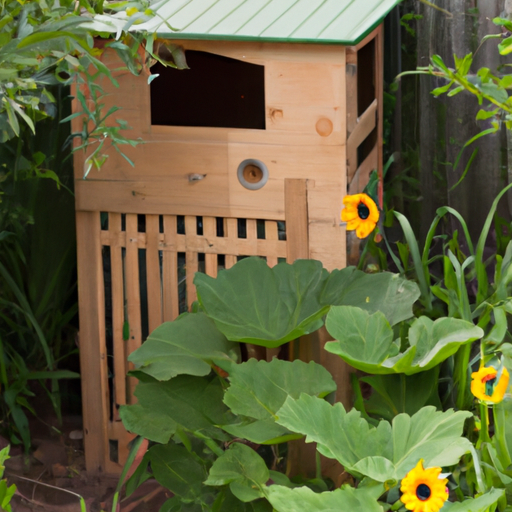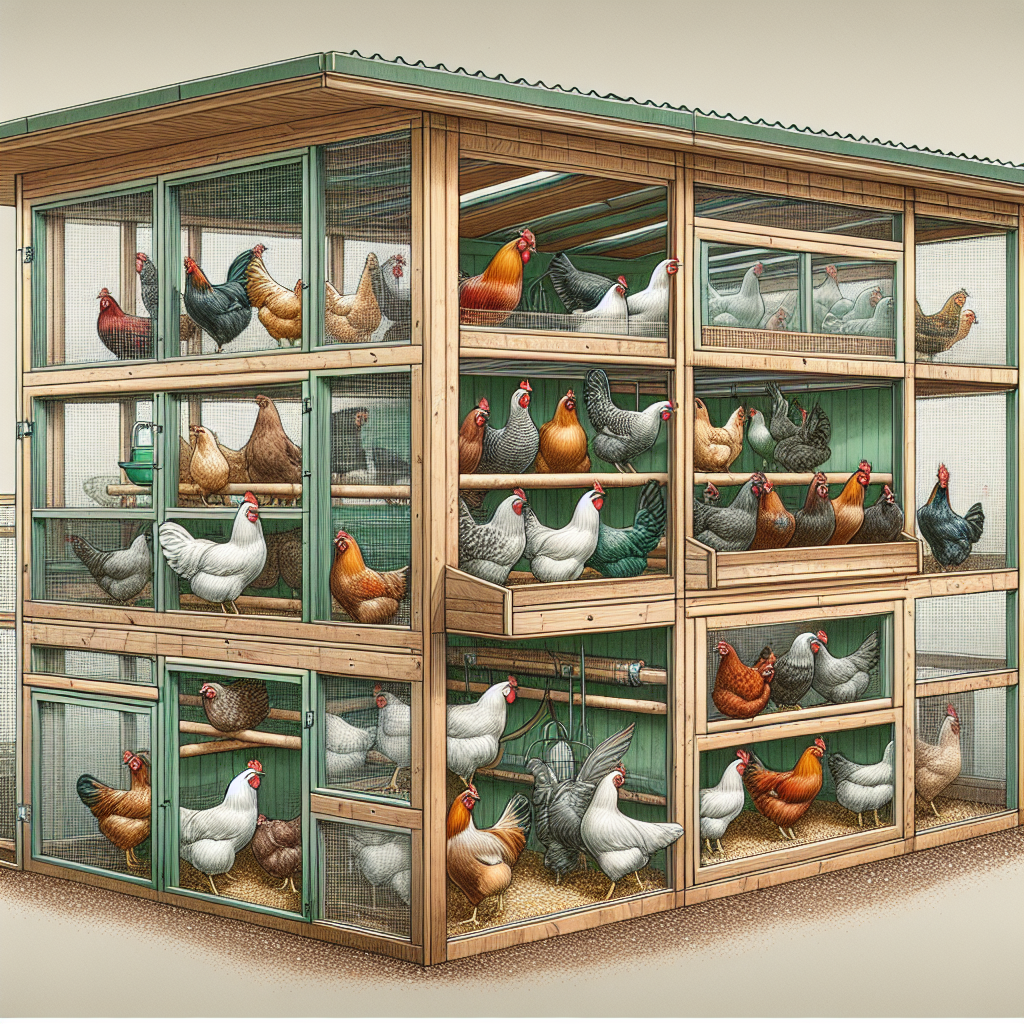Are you a chicken enthusiast or planning to start your own backyard flock? If so, then you might be wondering how to choose the perfect coop variety that suits your unique chicken-keeping needs. With so many options available, it can be overwhelming to make the right decision. Thankfully, this article will guide you through the process of determining the best coop variety for your chickens, ensuring their comfort, safety, and overall well-being. Whether you have limited space or a large backyard, finding the ideal coop that meets your specific requirements is essential for creating a happy and healthy environment for your feathered friends.
Factors to Consider for Choosing a Coop Variety
When it comes to choosing a coop variety for your chickens, there are several factors that you should consider. These factors will play a significant role in determining the best coop variety for your specific chicken-keeping needs. By carefully considering these factors, you can ensure that you provide a comfortable and safe environment for your feathered friends.
Space Requirements
One of the first factors you should consider when choosing a coop variety is the space requirements. Different coop varieties come in varying sizes, so it’s essential to consider how much space you have available for your chickens. If you have a small backyard, you may need to opt for a smaller coop variety that can accommodate fewer chickens. On the other hand, if you have a larger property, you can choose a coop variety with more significant capacity.
Climate Considerations
Another crucial factor to keep in mind is the climate in your area. Chickens are sensitive to extreme temperatures, so it’s essential to choose a coop variety that is suitable for your specific climate. If you live in an area with hot summers, you may want to consider a coop variety that provides adequate ventilation or even built-in cooling systems. On the other hand, if you live in a colder region, you may need a coop variety with insulation and heating options to ensure your chickens stay warm during the winter.
Predator Protection
Predator protection is a significant concern for any chicken owner. Choosing a coop variety that offers excellent predator protection is crucial to keep your chickens safe. Make sure the coop variety you choose has secure locks and latches to prevent predators from gaining access. Additionally, consider coop varieties with reinforced wire mesh or solid construction to deter predators such as raccoons, foxes, and snakes.
Ease of Cleaning
Keeping the coop clean is essential for the health and well-being of your chickens. Therefore, you should consider the ease of cleaning when selecting a coop variety. Look for coop varieties that have convenient access points and removable features that make cleaning a breeze. Coop varieties with removable trays or flooring can make it easier to remove waste and maintain cleanliness.
Durability
Durability is another factor to consider when choosing a coop variety. You want to invest in a coop that will withstand the elements and last for years to come. Look for coop varieties made from sturdy materials such as solid wood or heavy-duty plastic. Coop varieties with weather-resistant finishes or coatings can also be a good option for long-term durability.
Different Coop Varieties
Now that you understand the essential factors to consider when choosing a coop variety, let’s explore the different coop varieties available. Each coop variety has its own unique features and benefits, so you can choose the one that best suits your specific needs and preferences.
Traditional Coops
Traditional coops are the most common and familiar coop variety. These coops typically have a stationary design and are ideal for those who have a permanent location for their chickens. Traditional coops can range in size and capacity, making them suitable for various flock sizes. They often feature a sturdy structure with access points for cleaning and egg collection.
Pros of Traditional Coops
- Sturdy and durable construction
- Typically larger in size, suitable for more significant flock sizes
- Provide a permanent and secure home for chickens
Cons of Traditional Coops
- Lack of mobility, cannot be easily relocated
- May require more extensive space due to their stationary design
Mobile Coops
Mobile coops, also known as chicken tractors, are a popular option for chicken owners who want to provide their birds with fresh foraging opportunities. These coops are designed with wheels or skids, allowing them to be easily moved around your yard. Mobile coops are ideal for those with limited space or who want to prevent their chickens from overgrazing in a particular area.
Pros of Mobile Coops
- Easy mobility allows for regular rotation and fresh grazing opportunities
- Suitable for smaller backyard spaces
- Can provide natural pest control as chickens free-range in different areas
Cons of Mobile Coops
- Limited capacity due to their smaller size
- Less protection against predators compared to traditional coops
Tractor Coops
Tractor coops are similar to mobile coops but typically offer more space and greater protection for your chickens. These coops often have a more substantial structure with solid walls and a roof, providing better predator protection. Tractor coops can be moved around your yard, just like mobile coops, allowing your chickens access to new foraging areas while keeping them safe.
Pros of Tractor Coops
- More substantial and sturdier construction compared to mobile coops
- Increased predator protection
- Improved mobility for fresh grazing opportunities
Cons of Tractor Coops
- Larger size may require more significant space in your yard
- Can be more challenging to move due to their weight
Portable Coops
Portable coops, also known as chicken arks, are lightweight and easily transportable. These coops are designed to be moved by hand, allowing you to relocate them as needed. Portable coops are an excellent option for those who want the flexibility to change their chickens’ environment frequently. They often feature a compact and simple design, making them suitable for smaller flocks.
Pros of Portable Coops
- Lightweight and easy to move by hand
- Compact design, ideal for smaller flock sizes
- Can be quickly relocated to different areas of your yard
Cons of Portable Coops
- Limited capacity due to their smaller size
- May offer less predator protection compared to larger coop varieties
Walk-in Coops
Walk-in coops, as the name suggests, are designed to be accessible for chicken owners to walk into. These coops offer ample space and headroom, making them ideal for those with larger flocks or who desire a coop that is more comfortable to navigate. Walk-in coops often have multiple access points and additional features such as nesting boxes and roosting poles.
Pros of Walk-in Coops
- Spacious and comfortable for both chickens and chicken owners
- Easy access for cleaning and egg collection
- Suitable for larger flock sizes
Cons of Walk-in Coops
- Require a more significant amount of space in your yard
- Can be more expensive due to their size and additional features
Comparing Coop Varieties
Now that you have a good understanding of the different coop varieties available, let’s compare them based on various factors to help you make an informed decision.
Cost
When it comes to cost, traditional coops and walk-in coops tend to be on the higher end of the spectrum due to their larger size and additional features. Mobile coops and portable coops are generally more affordable, while tractor coops fall somewhere in between. Your budget will play a significant role in determining which coop variety is the most cost-effective for you.
Mobility
If mobility is essential to you, then mobile coops, tractor coops, and portable coops are your best options. These coop varieties can be easily moved to different areas of your yard, allowing your chickens access to fresh grazing opportunities. Traditional coops and walk-in coops, on the other hand, are stationary and cannot be easily relocated.
Suitability for Different Climates
Considering the climate in your area is crucial when choosing a coop variety. Traditional coops and walk-in coops provide more flexibility in terms of climate control. They can be easily insulated or equipped with heating systems for colder climates or provide ample ventilation for hotter regions. Mobile coops and portable coops may offer some climate control features but to a lesser extent.
Predator Protection
When it comes to predator protection, traditional coops, tractor coops, and walk-in coops are generally more secure due to their sturdy construction and solid walls. Mobile coops and portable coops may offer some degree of protection but may require additional measures to enhance predator deterrence.
Ease of Cleaning
All coop varieties can be cleaned, but the ease of cleaning may vary. Traditional coops and walk-in coops often have multiple access points and removable features that make cleaning straightforward. Mobile coops and portable coops may have smaller access points, requiring more effort to clean thoroughly.
Size and Capacity
The size and capacity of the coop variety will depend on the number of chickens you plan to keep. Traditional coops and walk-in coops generally offer more significant space and capacity, making them suitable for larger flocks. Mobile coops, portable coops, and tractor coops are better suited for smaller flocks or those with limited space.
Determining Your Chicken-Keeping Needs
Now that you have learned about the different coop varieties and compared them based on various factors, it’s time to determine your specific chicken-keeping needs. Consider the following factors to help guide your decision:
Number of Chickens
How many chickens do you plan to keep? The number of chickens will directly impact the size and capacity of the coop variety you choose. Ensure that the coop can comfortably accommodate all your chickens and provide enough space for them to move around freely.
Breeds and Sizes
Consider the breeds and sizes of your chickens. Some breeds are larger and require more space, while others may be more docile and can tolerate smaller living spaces. Evaluate the specific needs of your chicken breeds to ensure the coop variety you choose is suitable for them.
Purpose of Keeping Chickens
Are you keeping chickens for eggs, meat, or both? If your primary purpose is egg production, you may want to focus on coop varieties that have nesting boxes and easy access for collecting eggs. If you plan to raise chickens for meat, you may need a larger coop with more substantial capacity.
Available Space
Evaluate the available space in your yard or backyard. Consider the dimensions available and any limitations or obstacles that may affect the installation or mobility of the coop. Choose a coop variety that fits within your available space without overcrowding or compromising your chickens’ well-being.
Budget
Finally, determine your budget for the coop variety. Consider both the upfront costs and the long-term maintenance and upkeep expenses. Factor in any additional features or customizations that you may want to add to the coop. Remember that a well-built and durable coop can be a worthwhile investment in the long run.
Determining your Budget
When determining your budget for a coop variety, it’s essential to consider various factors that can contribute to the overall cost. By evaluating these factors, you can make an informed decision and ensure that you are getting the best value for your money.
Upfront Costs
The upfront costs of a coop variety can vary depending on its size, features, and materials used. Walk-in coops and traditional coops usually have higher upfront costs due to their larger sizes and additional features such as nesting boxes and roosting poles. Mobile coops, portable coops, and tractor coops tend to be more affordable.
Maintenance and Upkeep
Consider the long-term maintenance and upkeep costs associated with the coop variety you choose. Traditional coops and walk-in coops may require more regular maintenance, such as repainting and sealing, compared to other coop varieties. Mobile coops and portable coops typically have fewer maintenance requirements.
Additional Features
If you desire additional features such as automatic doors, integrated watering systems, or built-in nesting boxes, be prepared to allocate a higher budget. Customizable features can add convenience and functionality to your chicken-keeping experience but may come with extra costs.
Longevity and Return on Investment
Lastly, consider the longevity and return on investment of the coop variety. A well-built coop made from durable materials may have a higher initial cost but can last for many years, reducing the need for frequent replacements. Investing in a high-quality coop upfront can save you money in the long run by avoiding costly repairs or replacements down the line.
By carefully considering these factors and determining your budget, you can select a coop variety that meets your specific chicken-keeping needs while staying within your financial means.
In conclusion, choosing the right coop variety for your specific chicken-keeping needs requires careful consideration of factors such as space requirements, climate considerations, predator protection, ease of cleaning, and durability. By understanding the different coop varieties available, comparing them based on various factors, and determining your individual needs and budget, you can make an informed decision and provide your chickens with a comfortable and safe home. Remember, finding the perfect coop variety is an investment in both your chickens’ well-being and your own enjoyment of chicken-keeping.




